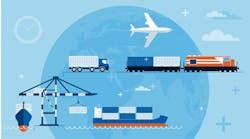Download this article in PDF format.
In early-April, 95% of U.S. companies were bracing themselves for COVID-related supply chain disruptions, according to the Institute for Supply Management (ISM). By late May, 97% of organizations were either already impacted by (or expecting to be impacted by) coronavirus supply chain disruptions. Pointing to longer lead times and poor inventory availability as their biggest pain points, most companies now expect “moderate to severe impact” on their operations through the remainder of 2020, ISM reports.
RateLinx and Agillitics want to help companies offset these and other impacts of the global pandemic and the subsequent economic recession. Working together via a strategic partnership, the two companies are offering an Accelerated Analytics Tower that helps companies transform their supply chains within 30 days.
RateLinx, a logistics data and service provider, and Agillitics, a supply chain consulting firm, are helping companies centralize their supply chain data and more efficiently scale their operations. The partnership combines Agillitics’ upstream data capabilities and services with RateLinx’s logistics data and services to deliver supply chain visibility and improvements.
In a world that is racing towards data-driven operations, the companies say that their union is all about helping customers become more competitive, agile and profitable. “Shippers are faced with many challenges that require quick and complex decisions that impact their supply chain,” said RateLinx’s Shannon Vaillancourt, in a press release.
“Our partnership with Agillitics allows us to integrate the logistics data with the upstream data to create a foundational dataset for decision making,” Vaillancourt added. “The artificial intelligence (AI) and machine learning within the RateLinx system ensures the data quality of the dataset which allows our customers to digitize the decision-making process.”
Harnessing the Data Monster
Pummeled by data from all angles, supply chain managers and procurement professionals need technology tools that help them sort through the data, make sense of it all and then use it for good decision-making. Today’s tech-driven landscape leads to disparate data sources from enterprise resource planning (ERP), warehouse management systems (WMS), transportation management systems (TMS) and other platforms.
“Data from so many sources requires intensive data quality measures and consumes resources,” the companies state. “Together, the partnership will help drive data quality and accurate insights across departments, transportation, warehousing, purchasing, operations, IT, and finance.”
“Advanced capabilities, such as AI, for functional supply chain solutions have shown a spotlight on the fact that decisions cannot be made in a silo,” Agillitics’ Tim Judge pointed out. “The interconnectivity of the supply chain calls for a harmonized data foundation and a repeatable data flow process to keep that data current.”
By partnering with RateLinx, Agillitics can help companies think beyond “single siloed metrics” and ensure that important metrics align across the supply chain to drive better business outcomes. The Accelerated Analytics Tower will also drive collaboration across teams and departments; improve data availability and visibility; and connect both internal and external stakeholders.
Practicing Proactive Resilience
RateLinx and Agillitics aren’t alone in their quest to help companies prepare themselves for the next supply chain disruption. Along with other technology vendors, individual companies are also implementing new measures that offset the impacts of COVID while also improving what PwC refers to as “proactive resilience.”
The consulting firm says companies with direct exposure to the COVID-19 outbreak are taking a number of actions, including (but not limited to):
- Transporting available inventory to areas away from quarantine zones and near ports where it can be accessed for shipping.
- Securing capacity and delivery status for Tier-2 and Tier-3 suppliers, and securing allocated supplies and overtime assembly capacity where possible.
- Buying ahead to procure inventory and raw material that are in short supply in impacted areas.
- Securing future air transportation as supply and capacity become available, shortening what might otherwise be ocean freight-based lead times.
- Activating preapproved parts or raw material substitutions in places where the primary supplier is impacted but a secondary supplier is not.
- Activating product redesign or material certification resources where reliable second sources of parts or raw material are not already available
Through these and other measures, companies are working to develop more resilient, agile supply chains that perform well in any business conditions.










